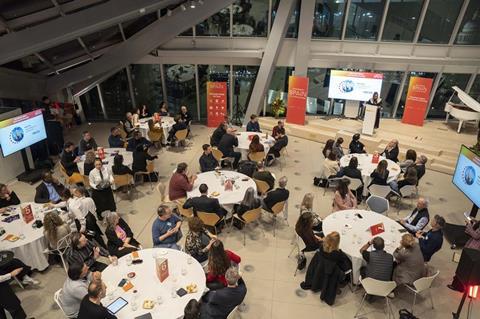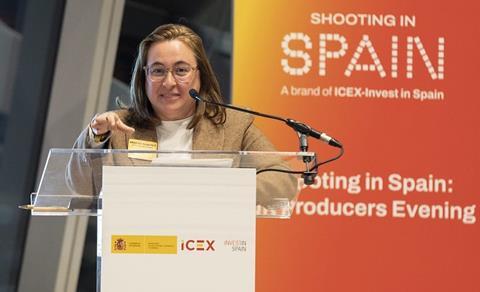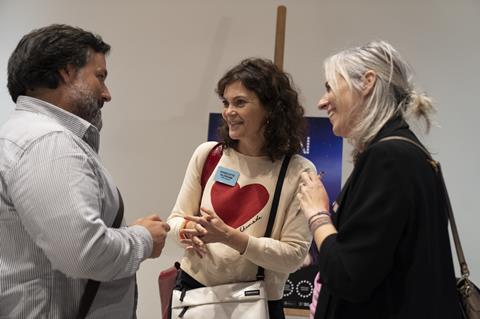UK producers explored country’s tax rebates and skills base at London event

Spain has for decades been seen as a reliable partner when it comes to international productions, with shows ranging from House Of The Dragon and Killing Eve to Kaos and feature Venom: The Last Dance all finding suitable shooting locations in the country.
Yet as production costs continue to rise around the world, the competition to attract international shows has only increased as countries vie to offer the best possible benefits to cash-strapped producers.
Spain is at the forefront of this race, looking to cement its status as a competitive place for international producers to do business.
“We need facilities and location, because without those you’ll be spending money to close gaps, but we also need easily accessible incentives - that is a massive part of the decision-making process,” says Bianca Gavin, head of production for scripted at the UK-based Gangs Of London producer Pulse Films.
Gavin was among a host of invited guests at Shooting in Spain: UK Producers Evening, a special event held in London in December at which UK and Spanish producers came together to share intel, knowledge and requirements as they looked to forge new relationships.
“You then start to get more granular,” continues Gavin, who is also chair of the Production Guild of Great Britain, “with questions around how long it might take to get your money back, what qualifies and what doesn’t – all those types of queries.”
“A minimum expenditure in Spain of €1m is required, with a maximum €20m of incentive per feature or €10m per episode allowed”
Vanesa Álvarez
The Shooting in Spain event aims to provide answers to those questions, exploring the whole gamut of support on offer while also connecting Spanish and UK-based professionals in person.
“We want to offer a package that is balanced,” explains Vanesa Álvarez, foreign direct investment projects director at ICEX-Invest in Spain, as she discusses her country’s offering compared with other territories.
“We have the fiscal incentive first, which has been improving over time, and we are always trying to make it more attractive,” she continues, pointing to a 30% saving on the first €1m spent and 25% on the rest. “A minimum expenditure in Spain of €1m is required, with a maximum €20m of incentive per feature or €10m per episode allowed.”

The offering is generating considerable interest among international producers, with executives from companies such as Banijay, Eleventh Hour Films and Fifth Season among those attending the Shooting in Spain event. And while producers require a broad array of physical locations and suitably skilled local crew, the increasingly competitive fiscal support on offer has become a key driver especially as budgets continue to be squeezed.
“We also have three special regions in Spain where the tax system is different,” Álvarez adds. The Basque Country, she explains, can offer incentives of up to 60%, while Navarra sits at up to 50% and the Canary Islands incentive rate runs to 54%.
“The Canary Islands offer one of the highest tax rebates in the world: 54% for the first million euros and then 45% on the remainder,” says Andrew John McLeod, a Brit who is now an exec producer for Film Canary Islands.
He says the islands’ industry has boomed over the past decade, with his team recently working on Paramount+ drama Stags, produced by the UK’s Eleven Film.
McLeod says his organisation was able “to guide [Eleven] through the many Spanish quirks, like accounting for the tax rebate and employment laws”, adding that the variety of locations on offer is a major draw for producers. “Our islands are small but have very diverse locations. They are often described as a ‘continent in miniature’, which makes travelling very convenient between locations when compared to a full-sized country.”
Álvarez highlights that achieving the advertised rates in the three regions requires additional requirements to be met and a key element of her job is to ensure that Spain’s tax incentive schemes are as transparent and easy to understand as possible.
She is also clear that Spain’s offering amounts to more than just soft money. “We have a totally diversified industry, with deep pools of talent and support around things like fast-track visas – the entire crew is granted the same 90 days as if they were coming in on a tourist visa but they can shoot and work on those days,” she says.

“If they need to stay longer then we have another regime for crews – the key thing we want is to be attractive.”
Another company looking to expand its activities in Spain is UK-based Clapperboard Studios, whose shows include The Good Ship Murder and The Teacher, both for the UK’s Paramount-owned Channel 5. “We need the tax credit, of course, but infrastructure is very important, as well as crew and locations,” says Clapperboard exec producer Andy Morgan.
His company often uses international locations to replicate other destinations and Spain’s geographical diversity, as well as its range of towns and cities, can help to remove cost from shooting in places like London.
Peter Welter, chief executive and exec producer at Spain’s Fresco Film, also highlights the breadth of Spain’s geography as a key attribute, pointing to “10 different climate zones, the biggest variety of natural and man-made locations in Europe, top infrastructure as far as road, railroad and air connections are concerned”, as well 320 days of sunshine a year.
Morgan also points to the importance of skilled local crew, adding: “We try to only take heads of department [HoDs] from the UK and then crew up locally as much as possible – that seems to work very well. And the HoDs really like it because the locals know the area, where to go for props or whatever – it just makes sense.”
“Spain also has a great track record for producing internationally. It has the local skill base to support international production”
Bianca Gavin, Pulse Films
Spain’s combination of tax incentives and broader support seems to be effective, particularly at a time when budgets are squeezed. Ferran Piquer, chief executive and co-founder of Spanish animation and VFX studio Efectoscopio, says he is seeing “a boom” in co-productions, especially where post-production and visual effects are included in the eligible expenses, with local companies able “to optimize post-production resources to the maximum” to drive efficiencies in a budget-conscious market.
“Spain also has a great track record for producing internationally,” adds Pulse Films’ Gavin. “It has the local skill base to support international production and there is that robust rebate, though it can take a long time to get the money back.
“It also has a really wide-ranging offering in terms of locations, as well as that sweet spot in the Canary Islands to get the uplifted rebate – I’m trying to encourage our teams to write everything to be based on the beach,” she jokes.
“There is certainly more than one production on our development slate that very strongly lends itself to shooting in Spain,” she adds. “We’re excited about the future.”








No comments yet